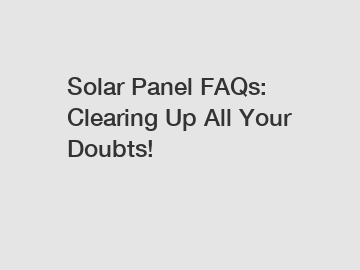Solar Panel FAQs: Clearing Up All Your Doubts!
Solar Panel FAQs: Clearing Up All Your Doubts!
Are you considering going solar but find yourself having a lot of questions? You're not alone! The world of solar panels can seem complex and overwhelming at first, but fret not. In this comprehensive guide, we will clear up all your doubts and provide you with the most accurate information you need to make an informed decision about solar panel installation.
1. How do solar panels work?

Solar panels are made up of semiconductor materials, usually silicon, which absorb sunlight and convert it into electricity. When sunlight hits the panels, it stimulates the electrons in the semiconductors, creating a flow of energy that can be harnessed for various purposes.
2. How much do solar panels cost?
The cost of solar panels depends on several factors, including system size, panel efficiency, and equipment quality. On average, residential solar panel systems can range from $10,000 to $30,000. However, it's important to consider the long-term savings and incentives that come with solar, which can significantly outweigh the initial investment.
3. What are the benefits of solar energy?
Solar energy offers numerous advantages. Firstly, it is a clean and renewable source of energy, meaning it doesn't produce harmful emissions or contribute to climate change. Solar panels can significantly reduce or even eliminate your electricity bills, allowing you to save money in the long run. Additionally, solar energy increases your energy independence and decreases reliance on fossil fuels.
4. How long do solar panels last?
Most solar panels come with a warranty of 25 to 30 years, but they can continue to produce electricity well beyond that timeframe. With proper maintenance and care, solar panels can last anywhere from 25 to 40 years, making them a worthwhile long-term investment.
5. Will solar panels work during cloudy or snowy days?
While solar panels are most effective when exposed to direct sunlight, they can also generate electricity on cloudy or snowy days. Solar panels operate based on the available light, so they will still produce some energy even when the sun is not fully visible. However, their efficiency may be reduced compared to sunny days.
6. How much space do I need for solar panels?
The space required for solar panels depends on factors such as the number of panels you need, their efficiency, and your energy consumption. On average, a typical residential solar panel system requires about 100-400 square feet of roof space. However, there are alternative options available, such as ground-mounted or community solar projects, for those with limited roof space.
7. Can I install solar panels on a flat roof?
Absolutely! Solar panels can be installed on both pitched and flat roofs. However, flat roofs may need additional mounting structures to ensure optimal panel tilt and sunlight absorption. Consulting with a professional solar installer will help determine the best installation approach for your specific roof type.
8. Are there any government incentives for installing solar panels?
Yes, there are several incentives available to encourage the adoption of solar energy. The most common incentive is the federal Investment Tax Credit (ITC), which allows you to deduct a percentage of the solar panel system's cost from your federal taxes. Additionally, many states offer their own rebates, grants, or tax credits to further reduce the cost of installation.
9. Is maintenance required for solar panels?
Solar panels generally require minimal maintenance. Regular cleaning to remove dirt, dust, or debris is recommended to ensure maximum efficiency. Additionally, you may need to trim nearby trees or vegetation that could cast shadows and reduce the panel's performance. However, modern solar panels are designed to withstand various weather conditions, making them durable and low-maintenance.
10. Can solar panels power my entire home?
In most cases, solar panels can generate enough electricity to power the majority, if not the entirety, of a home. However, this depends on factors such as your energy consumption, system size, panel efficiency, and available sunlight. By analyzing your energy needs and working with a solar professional, you can design a system that meets your specific requirements.
In conclusion, solar panels offer a sustainable and cost-effective solution for powering your home. By generating clean energy and reducing reliance on traditional sources, you can contribute to a greener future. If you have any more questions or concerns about solar panels, consult with a reputable solar provider to guide you through the process. Embrace solar energy and start maximizing the benefits it offers today!
Want more information on what is bipv, China solar tile company, bipv curtain walls? Feel free to contact us.

Comments
0